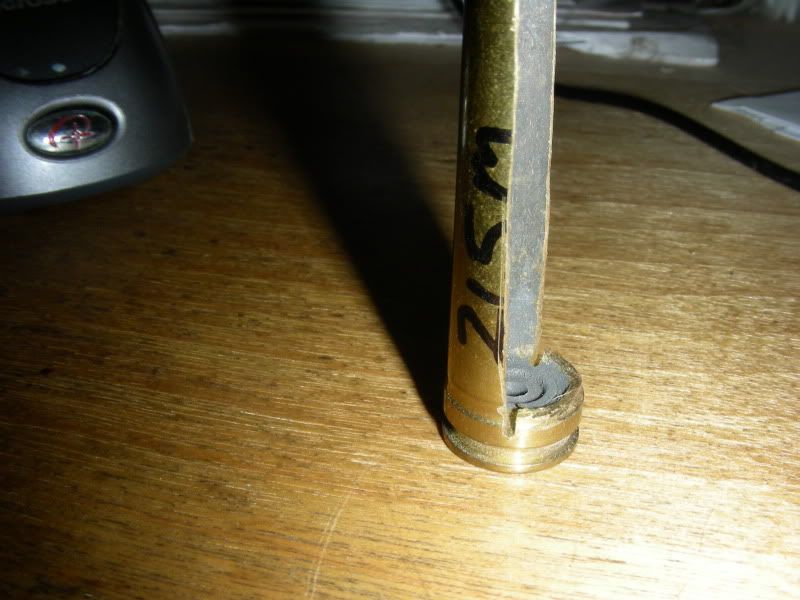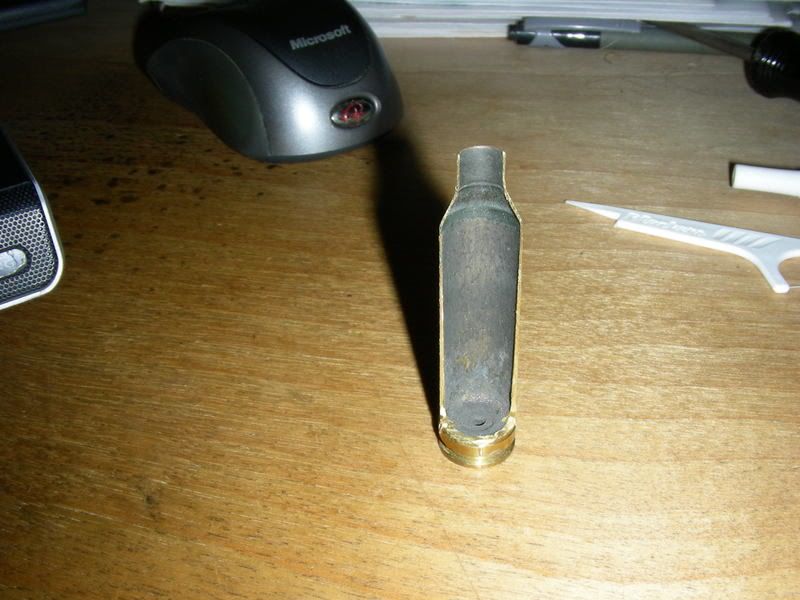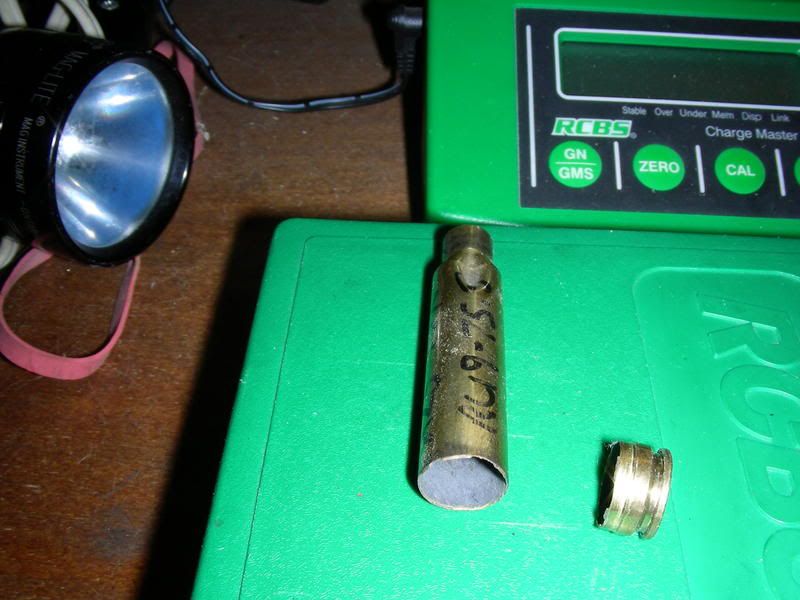

 The Accurate Reloading Forums
The Accurate Reloading Forums  THE ACCURATE RELOADING.COM FORUMS
THE ACCURATE RELOADING.COM FORUMS  Guns, Politics, Gunsmithing & Reloading
Guns, Politics, Gunsmithing & Reloading  Reloading
Reloading  RING AROUND YOUR (BR)ASS
RING AROUND YOUR (BR)ASSGo  | New  | Find  | Notify  | Tools  | Reply  |  |
| One of Us |
What does a complete -- concentric -- ring around your brass mean? I've seen this once on a 30-06 about 1/2 - 3/8" from where the tapered angle begins. Recently saw it again but this time it was 1/8" from the tapered angle begins. I was thinking maybe the barrel setback is to far?? It got me wondering. What say you? | ||
|
| one of us |
Possible pending casehead separation. Also could be chamber diameter slightly oversized. muck | |||
|
| one of us |
I've also seen similar rings caused by ammo riding around in plastic ammo boxes. They'll get rings at the top edge of the grid or holes that they are in. If your ring is at the height of your ammo box rack that's what it is..........................DJ ....Remember that this is all supposed to be for fun!.................. | |||
|
| one of us |
I'd suspect it is the Pressure Ring created by Pressure Ring Expansion(PRE). If you have a Speer Manual, I can send you to a page where a cut-away flick will show what is happening. It occurs at the point where the "Inside Taper" of the CaseHead melds into the CaseWall. Upon firing, the Case Expands(as I'm sure you know) and the Internal Taper stops the Pressure Ring from moving closer toward the CaseHead. The width of the PRE is dependant on the amount of Pressure generated by the specific Load combination and is measurable. Known as the very best Pressure Indicator ever devised by man - PRE. CHE is also useful and is the only thing which will help Wildcatters keep from totally wasting Cases. The Pressure Ring generally becomes "visible" to people who are not familiar with it once they run the Fired Case through their FL Resizing Die. Typically the Die will lightly "burnish" the Pressure Ring and cause it to become apparent. Best of luck to you. | |||
|
| One of Us |
What he said. . . . Usually a case seperation will happen about a 1/2" above the case head. I get that ring just below the case neck from the plastic boxs as they rub the edge of the box seperator. Feel the line with your fingernail. If you can feel it, then it is case seperation. If that is the case, then your sizing die needs to be backed out until the bolt just closes with a very slight resistance on the case shoulder. Cheers. | |||
|
| One of Us |
A re-bent paper clip with a 1/8" 90 degree turn on the end is the best way to see if you are about to have case seperation. (Insert 90 degree portion of paper clip in to case mouth and use it as a probe to feel for a thinned out ring inside the case, but you probably already know that). I too have had the ring around my case caused by the plastic cartridge boxes. Case seperation rings/marks usually do not go 360 degrees around the case, but it can. "The right to bear arms" insures your right to freedom, free speech, religion, your choice of doctors, etc. ....etc. ....etc.... -----------------------------------one trillion seconds = 31,709 years------------------- | |||
|
| one of us |
A photo of your ring would help. Does it look like any of these photos? Link to Photobucket | |||
|
| new member |
Ive seen something similar on my brass, eventually tracked it down to the lee (outside) chamfer tool scratching. | |||
|
| One of Us |
I agree with these. Case seperations occur approx 1/2" from head. Take a sharpened paper clip with the sharpened end bent 90 degrees and drag it inside from the head to the mouth. A case that is getting ready to seperate will definitely cause the point to feel the spot. No drag or hang up and the case is good to go. Those hard plastic ammo boxes will leave a nice concentric ring and depending if mouth up or mouth down, can really fool you. I have had cases with the faintest ring near the head end that I thought was nothing. The paper clip told otherwise. It doesn't lie! PA Bear Hunter, NRA Benefactor | |||
|
| One of Us |
Carbon copy of the ring around your brass in the photo. Same area! | |||
|
One of Us |
 ____________________________________ There are those who would misteach us that to stick in a rut is consistency - and a virtue, and that to climb out of the rut is inconsistency - and a vice. - Mark Twain | Chinese Proverb: When someone shares something of value with you and you benefit from it, you have a moral obligation to share it with others. ___________________________________ | |||
|
| one of us |
Not sure what photo? If this one -  The shiny ring is a sign of case separation starting. It can happen in the middle of the body or near the head. Most times it is caused by pushing the shoulder back to much when full length resizing. The cartridge headspacing is to short for the chamber. On firing the brass streches to fill the rifle chamber, over working the brass. If this happens with new factory ammo, have the rife checked by a gunsmith. The shiny ring is a sign of case separation starting. It can happen in the middle of the body or near the head. Most times it is caused by pushing the shoulder back to much when full length resizing. The cartridge headspacing is to short for the chamber. On firing the brass streches to fill the rifle chamber, over working the brass. If this happens with new factory ammo, have the rife checked by a gunsmith. | |||
|
| One of Us |
This picture l;ooks like a smaller reamer was used to chamber the barrel than the original chamber, i.e. it may have been short chambered for .308 and was ultimately chambered 30-06. PA Bear Hunter, NRA Benefactor | |||
|
One of Us |
I have never heard of or seen a case separation at this point. Case head separations always happen just above the solid case head where the floor of the powder column is    I'm with dj and have seen these rings from where they wobble around in the ammo box. Also have seen rings from using the Lee Chamfer tool to outside chamfer  the open end of the tool will mark the case ____________________________________ There are those who would misteach us that to stick in a rut is consistency - and a virtue, and that to climb out of the rut is inconsistency - and a vice. - Mark Twain | Chinese Proverb: When someone shares something of value with you and you benefit from it, you have a moral obligation to share it with others. ___________________________________ | |||
|
| one of us |
Biscut's ring could be from many things. But case separations do happen in the body. The cause is pushing the should back .010" or more on sizing. Also can happen fire forming a wildcat, or 6ppc. Link with photos. Link with Photo The photo WOODS posted from MY photobucket is caused by a Chamber Adapter. Firing 308 in a 30-06 chamber, see link at photo. | |||
|
One of Us |
I see what you mean. Most case head separations I am familiar with happened on belted cases. Perhaps the criteria is different on unbelted cases. The link you gave and their discussion seems to indicate that they were mostly mystified by the location of the separation also. Some speculated on an annealing line or lube line having an influence. However, knowing BISCUT he better not be pushing his shoulder back .010" every sizing or I'll whip his a$$! He'll wander back through here eventually and straighten us out or at least better inform us as to what kind of boolit it happened on. It might have been on one of his many AR calibers but probably not on his 30-06AI. ____________________________________ There are those who would misteach us that to stick in a rut is consistency - and a virtue, and that to climb out of the rut is inconsistency - and a vice. - Mark Twain | Chinese Proverb: When someone shares something of value with you and you benefit from it, you have a moral obligation to share it with others. ___________________________________ | |||
|
| One of Us |
Ditto. This is from a ring left in the chamber. | |||
|
| one of us |
Woods, my case separations were cause by a defective Dillon shell plate ,Dillon RL-450 loader. Each slot is different. If the FLRS bottle neck type die is adjusted on the smallest slot, the shoulder will be pushed back to much,excessive cartridge headspace is the results. A cartridge case gauge is not of much use here as they seem to only find really bad ammo. A comparator works better for measuring head to shoulder, but some brass will get shorter on firing in large 5.56mm chambers. Also if the FlRS die is adjusted touching the smallest slot in the shell plate, the finished rounds COL will be hard to control also. You will have 4 different head to shoulder measurements and 4 different or more COL's Following is email to Dillon and there reply. "The Dillon shell plate used to load 5.56mm seems to be undersize. A standard RCBS shell holder measures .125". The Dillon is from .116" to .124" on the same(5.56mm) #3 shell plate taking measurements using 2 different methods. A different shell plate #1, used for 243/30-06 is undersize at .117" If you adjust your Full Length Sizing die by turning it down till it hits the shell plate as per Dillon instructions & RCBS, your shoulder could be pushed back to far resulting in excessive headspace by as much as .009" Firearm used M16A1, rifle headspace checked with field gauge, OK. Cases, Federal and LC fired 1 to 3 times. Failure rate of ammo 4 % , 2 different separation points, Federal in shoulder area, LC 2/3 way down for head. Bullet 55gr fmj. Load IMR 4198-20.5gr. Misc primers. Ammo in storage/loaded 1987. Dillon RL-450 the one before the 550B. Dies RCBS. FLRS die adjusted to just kiss the shell plate. The 2 methods used to check the shell plate are 1. A .020" feeler gauge was held under the plate and a micrometer used, then subtraction of the feeler gauge dia. for the final measurement. 2nd method was a steel plate under the shell plate, an RCBS dial caliber used to measure from the leading edge of the plate to the bottom steel plate. Both measurement were the same give or take .0005" A Shoulder Comparator or a case gauge would have been useful back in 1987. So my question is (if you have read this far lol) What do your Dillion shell plates measure?? Am i looking at this wrong?" Dillons Reply " Date: Tuesday, November 18, 2008, 4:24 PM No 450 dimensions available anymore. 550 plate dimensions should be .250? thick top to bottom, .132” +/- .005” from underside of the shellplate to top recess where the die contacts. Thank you, Dillon Precision Products, Inc."  | |||
|
| One of Us |
Guys, the ring is just like the one in WOODS post. After tumbling a few hours the ring is no more. Probably means it was the plastic ammo box ring? I use Frankford Arsenal plastic 50rd boxes from midway. WOODS: I'm using the Hornady/Sinclair tool to adjust my FL die for partial sizing. Great tool!!! Since I bought this gage I don't even neck size!! Works great. | |||
|
| Powered by Social Strata |
| Please Wait. Your request is being processed... |
|

Visit our on-line store for AR Memorabilia

